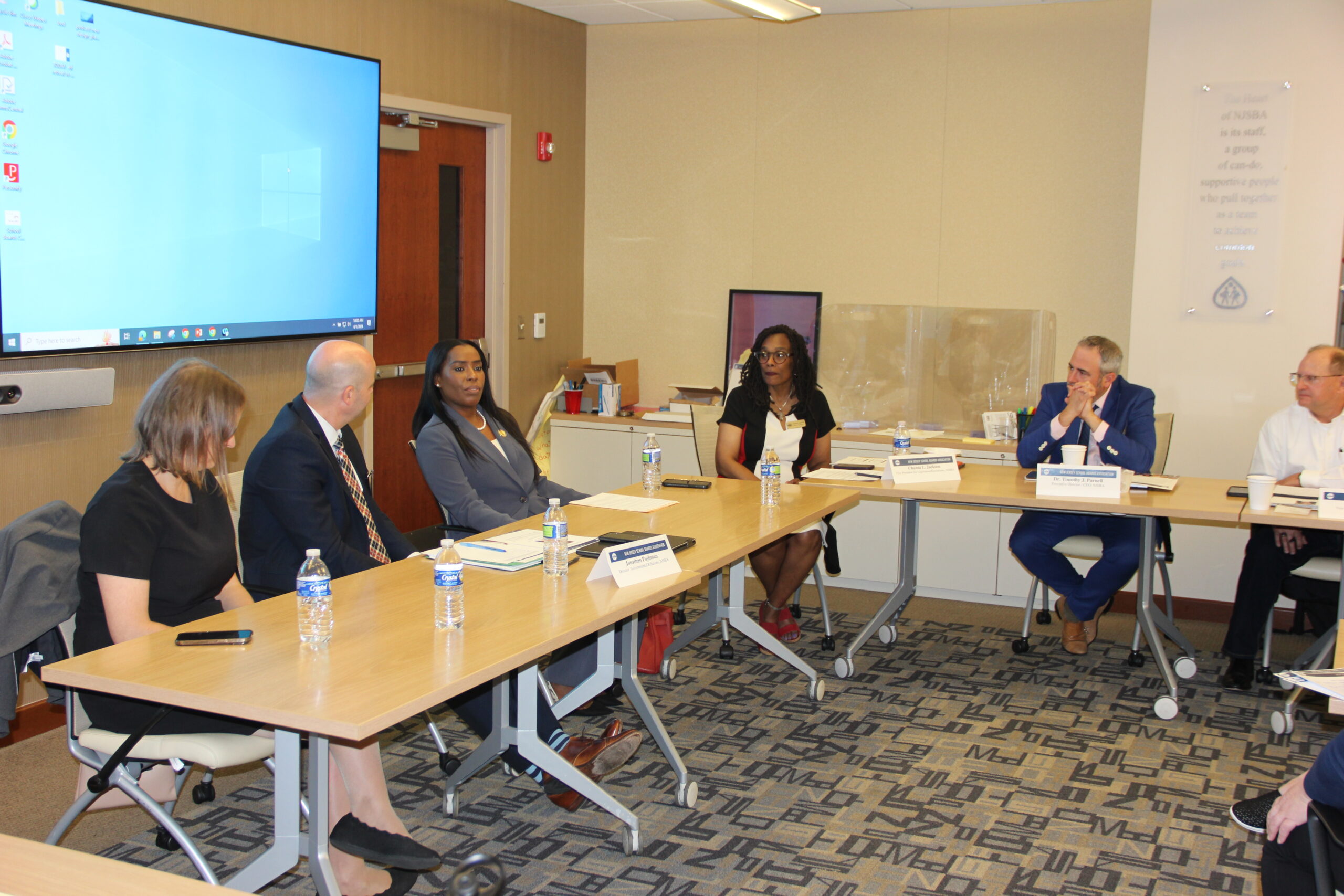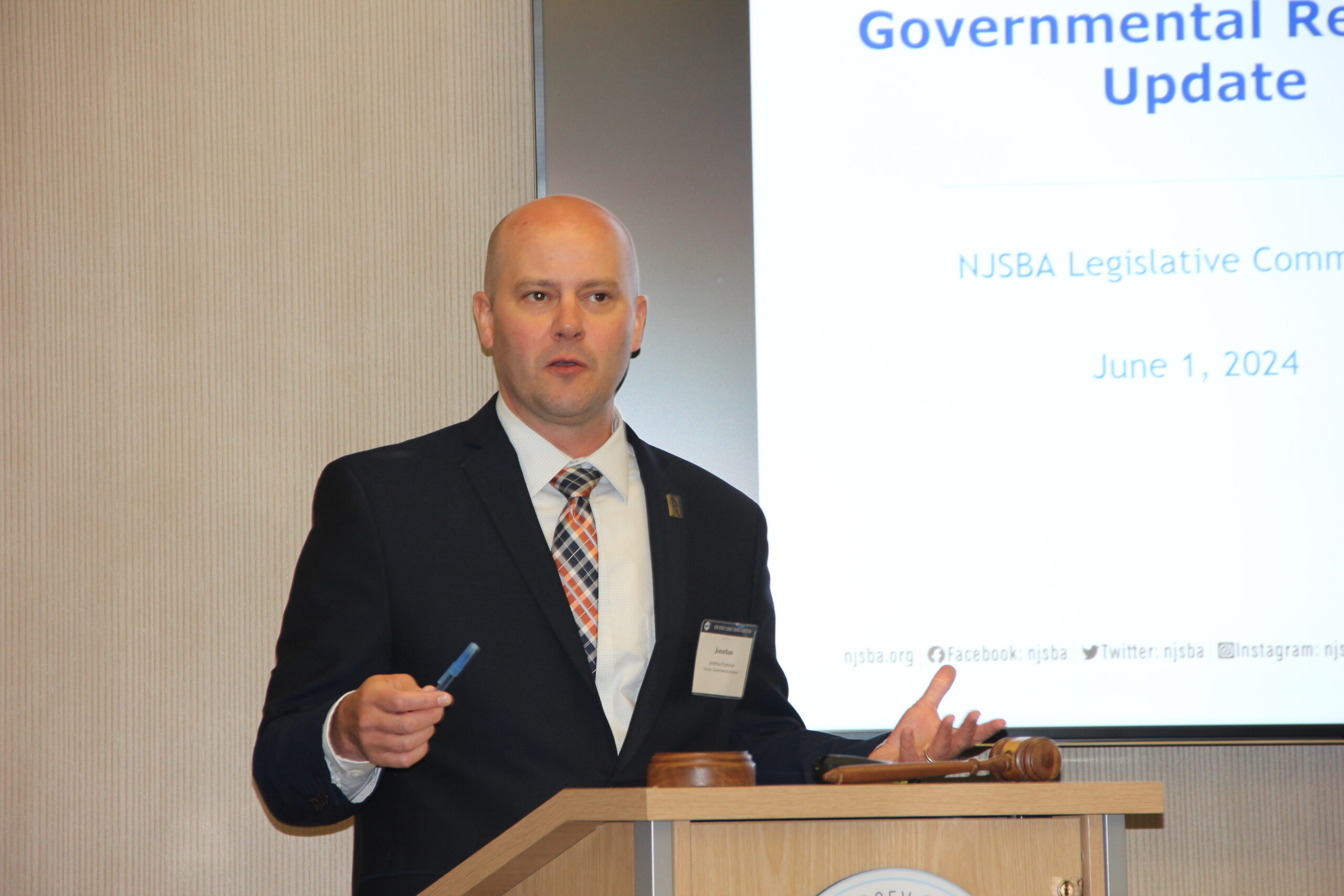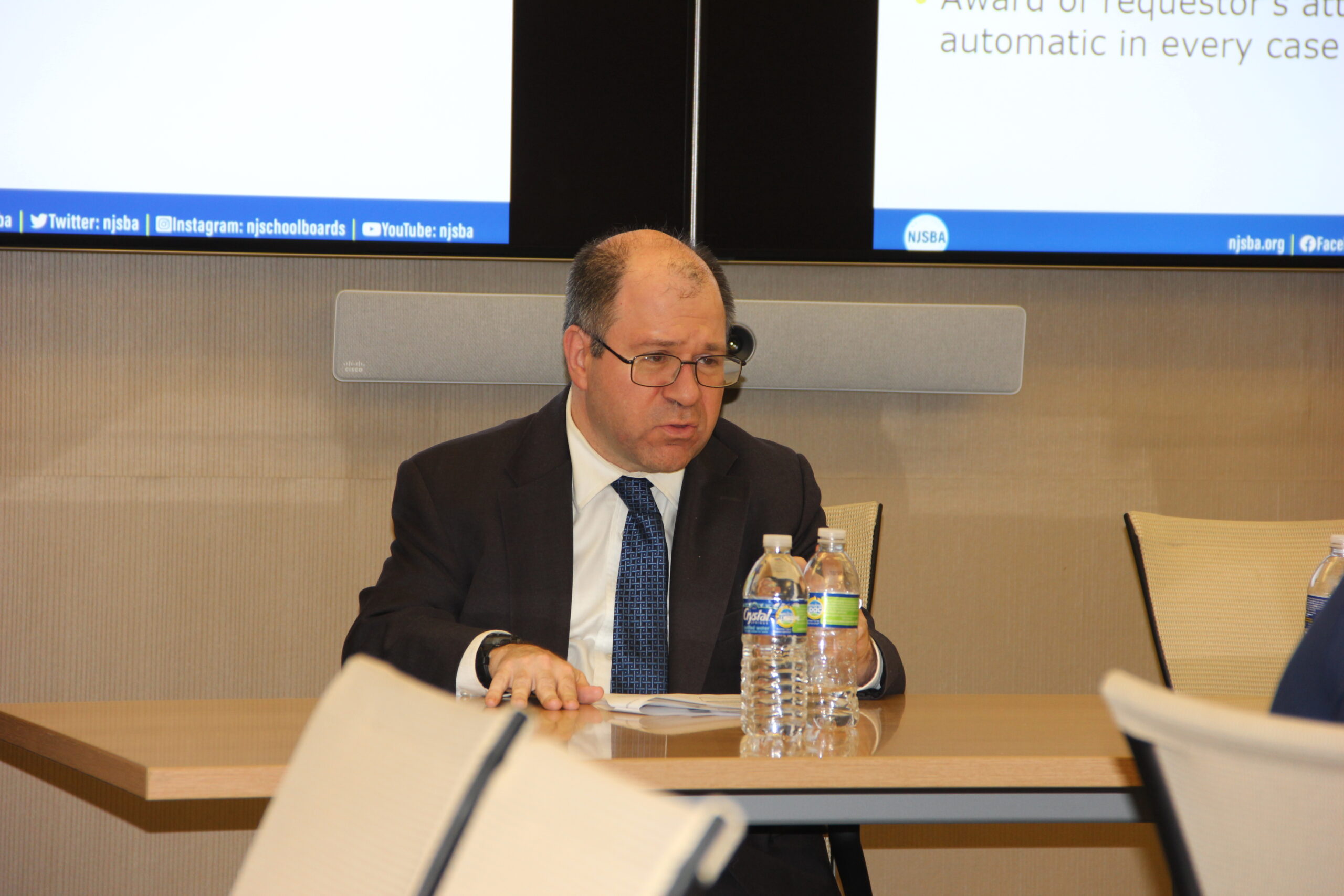Board members from throughout the state enjoyed gathering in person for the New Jersey School Boards Association’s Legislative Committee meeting on June 1, which featured two legislators as guest speakers: Assemblywoman Andrea Katz, Legislative District 8; and Assemblywoman Tennille R. McCoy, Legislative District 14.
Chanta L. Jackson, vice president for legislation and resolutions at the NJSBA, called the meeting to order from the Association’s headquarters in Trenton.
Dr. Timothy Purnell, executive director and CEO of the NJSBA, recognized the dedication of board members who spent their Saturday morning working to advance the education of all children. He also saluted the Association’s governmental relations team for the hard work they do every day.
“We will continue to support you in advocating for what is best for all children,” he said, highlighting some recent legislative developments in Trenton that the NJSBA supported, such as A-4161/S-3081, which Gov. Phil Murphy signed into law on May 15. The legislation provides for a partial restoration of aid to districts that had lost funding under the School Funding Reform Act and gives districts with flexibility in exceeding tax levy growth limitations in the 2024-2025 school year.
The NJSBA worked closely with the bill’s sponsors and issued multiple action alerts to urge members to contact their legislators to support the bill, Purnell said. Moreover, NJSBA staff testified multiple times in hopes of advancing the legislation, while also highlighting the need for further adjustment of the SFRA, he said.
Purnell also shined a spotlight on S-2082/A-3413, which the governor signed May 17, establishing the New Jersey Educator Evaluation Review Task Force, which will study the evaluation system for teachers. NJSBA has secured representation on that committee, he said. “We will have a voice at the table, which is so important,” he said, noting that teacher recruitment and retention are among the top priorities of the Association.
Another bill he mentioned is A-2180/S-3000, which sits on the governor’s desk and would allow flexibility in the licensing of school bus drivers to increase the pool of candidates for school districts.
Attendees Hear from Legislators
Katz, who represents Atlantic and Burlington counties, was the first legislator to speak at the meeting. The mother of three turned public policy advocate and assemblywoman, she formerly served on the Chesterfield Township school board, where she advocated for children with special needs as well as the need to update the SFRA and on boosting behavioral and mental health services for children. She also served on the Chesterfield Township Committee.
She shared that she first got involved in politics after someone asked her to seek a vacated school board seat. As the mother of special education students, she thought she could make a difference, and once on the board, she “fell in love what we can do for children every day.”
Earlier in her life, she actually thought she would be a teacher, but she ultimately realized it was in the advocacy space where she could make a bigger difference that is more aligned with her talents, she said.
“The only job that even compares to the job I have now as an Assembly member is the time I spent on the school board – and as a stay-at-home mom,” she said. “You are dealing with the issues – it is all rolling down to our schools. You have now become the safety net for mental health and food security,” she said.
McCoy, who represents Mercer and Middlesex counties, is a human resources executive and Realtor, who was an assistant commissioner for the New Jersey Department of Labor and Workforce Development. She also served in the governor’s office as employee relations coordinator and is a member of the Hamilton Township Democratic Committee. She is also a Mercer County Technical board of education member, which is an appointed board.
Although some people thought McCoy would leave her post as a school board member while campaigning for election to the Assembly, she shared with attendees that she continues to serve because she’s so passionate about providing future leaders with the resources they need to succeed.
She also spoke about how her father, Samuel McCoy III, a business owner who was a baseball coach for 40 years in Mercer County, was active in his community and instilled in her a drive to succeed. “Dad would make us get the newspaper off the porch, and we would read the newspaper together, and whatever words we did not know – those were the spelling words for the week,” she said.
To honor her father, who died in 2018, she started the Samuel McCoy III Scholarship Fund, a nonprofit 501©3, which provides scholarships to children in Mercer and Middlesex Counties. “For me, it has always been very important to make sure education is a top priority,” she said.
McCoy highlighted the need to give teachers timely feedback but in a manner that is not burdensome to educators, as well as the need to make sure teachers have a mentor to boost retention. While she believes there are some benefits to virtual instruction, she said it can’t become the norm as it is imperative that teachers continue to have face time with students.
She noted that the state should open up the conversation about teacher pension reform and that the condition of schools and educational facilities are of “the utmost importance.”
McCoy shared that as a leader, it is very important for her to create other leaders. As a board member at Mercer, she focuses on determining what employers are looking for and making sure students hone the skills they need to succeed in the workplace. She thinks internships and apprenticeships can be incredibly valuable.
At the meeting, attendees had the opportunity to ask the legislators questions, with school funding being one of the top priorities.
Katz emphasized the need for school districts to know how much state funding they will get year to year, which currently is not the case. “You don’t know what that aid package will become until the last possible minute,” she observed.
Asked about the notion of teacher reciprocity, McCoy said that it’s important to reach across state lines to build the pool of candidates.
The rest of the meeting was dedicated to a governmental relations update provided by Jonathan Pushman, the NJSBA’s director of governmental relations; and John Burns, the NJSBA’s longtime senior legislative counsel.
Burns delved into S-2930/A-4045, which revolves around the Open Public Records Act and is sitting on the governor’s desk. It would be the first overhaul to the act in 24 years, he said.
Among its provisions is that it clarifies that public agencies have a duty to protect the private information of citizens. Also, it states that respondents to open public records requests, such as school districts, could direct someone requesting information to a district website.
The changes should shorten the time period in which a requestor asks for information until the time they receive it, Burns said.
“From the perspective of a records custodian, it should make records requests a little faster … this bill will make the requests on records custodians a little more manageable,” Burns said.
The bill has not come without controversy, however, as there has been extended testimony on it from both sides. The NJSBA has supported the legislation.
Burns also highlighted S-2422/A-3521, which would establish occupational heat stress standards and an “occupational heat-related and injury prevention program.” He told attendees that the NJSBA has concerns with the bill, and that the Association believes each school district should be allowed to make its own plan to reduce heat stress on employees.
Pushman brought a couple of other bills to the attention of attendees, including A-3873, which would allow certain public high school student athletes to substitute study hall for physical education during their athletic seasons. The NJSBA is monitoring the legislation.
He also noted S-3195, which would prohibit food service businesses (including schools) from providing single-use plastic utensils and condiments to customers, except upon request. Attendees noted that some schools do not have facilities with industrial dishwashers – and that utensils could be misused by younger students (posing the risk of injury) or used as a weapon by older students – again posing a safety hazard. The NJSBA is opposing the legislation, Pushman said.
Another piece of legislation that the NSJBA is monitoring is S-3240/A-4369, which would permit 16- and 17-year-olds to vote in elections for the local school board. Pushman noted the bill would bring the state into “uncharted waters” and that the Association is closely watching developments.
To view the full text of any of the bills summarized above, please visit the New Jersey Legislature’s website.














